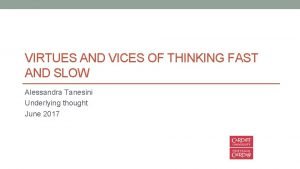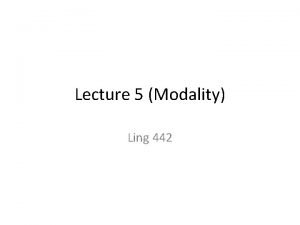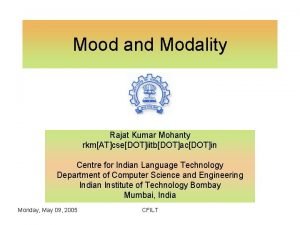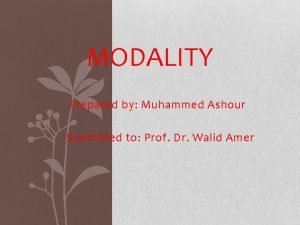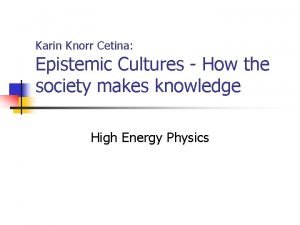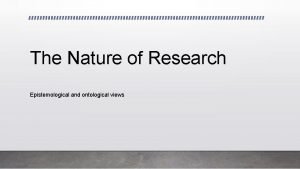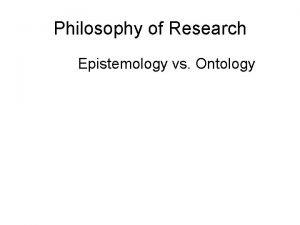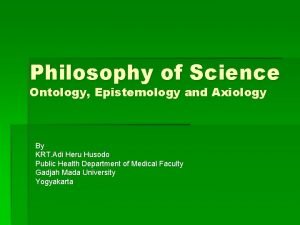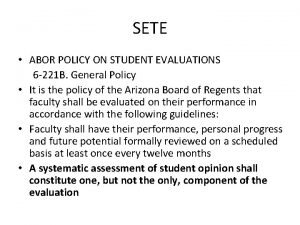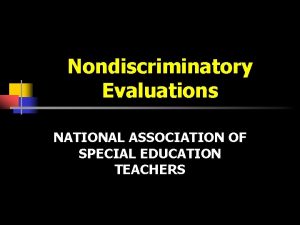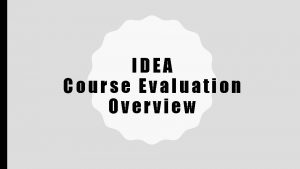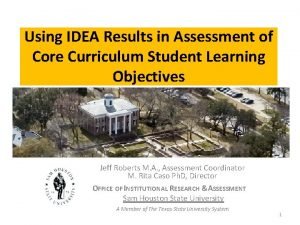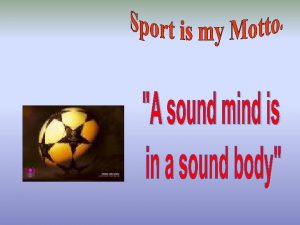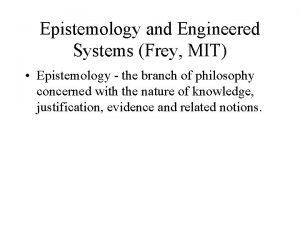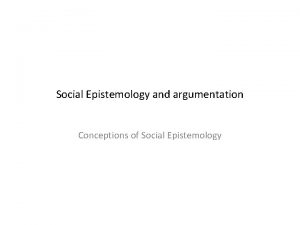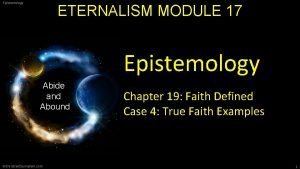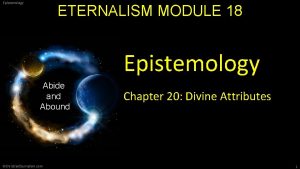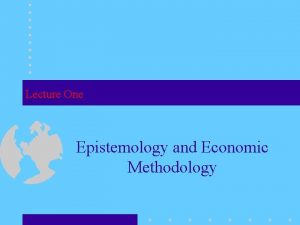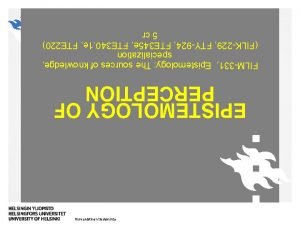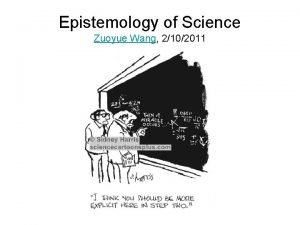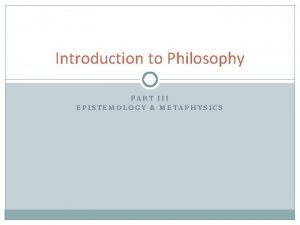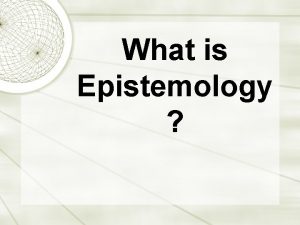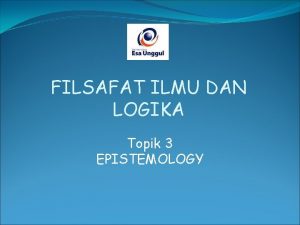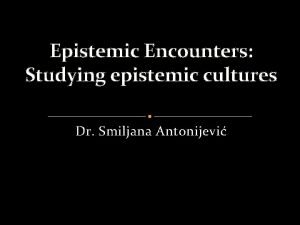Inquiry Epistemology Epistemic activities and epistemic evaluations Vices

















- Slides: 17


§ Inquiry Epistemology § Epistemic activities and epistemic evaluations § Vices and virtues § Sensibilities, Thinking Styles, Character Traits § Agency § Motivation

§ Classical Epistemology § Definition of knowledge, etc § Answering the skeptic § Ameliorative Epistemology § Understanding human epistemic activities § Developing interventions to improve performance

§ The study of inquiry and other epistemic activities § Evaluating them by how they meet relevant epistemic standards such as: § Conducive to knowledge § Conducive to responsibly held belief § So the focus of evaluation are activities rather than exclusively processes or their outputs

§ An epistemic activity is something one does whose goals are primarily cognitive § Observing, listening § Doing an arithmetical sum § Teaching a class § Epistemic Evaluation § Assessment by epistemic standards § E. g. , is it true, reliable, does it promote the agents’ epistemic goals, is it a likely means to goals § Often epistemic activities are themselves evaluations § One may investigate whether a belief is true § Epistemic activities are generally monitored and guided by evaluations

§ Doxastic Evaluations § Deliberations about evidence resulting in belief or suspension of belief § Metacognitive reflection about the epistemic status of a belief or about the epistemic properties of a cognitive process § Affective Evaluations § Fear, excitement and other affects that guide attention § Metacognitive or noetic feelings (feeling of doubt, certainty confidence) § Feelings need not represent to serve as evaluations. § They might indicate the presence of evaluative properties by tracking them. § Evaluations regulate epistemic activities by § Guiding them § Monitoring them § Affective evaluations also play a motivational role

§ Virtues and vices reflect well or badly on the person § Epistemic activities are exercises of epistemic agency § Virtues and vices are dispositions to carry out these activities in distinctive ways. § Vices are ways of doing these badly because § Set inappropriate epistemic goals § Frustrate the achievement of epistemic goals § Vices partly consist in characteristic patterns of epistemic evaluation (cognitive and affective) § At the root of vices lie epistemically bad motivations

§ Sensibilities are ways of deploying one’s perceptual capacities in the service of epistemic activities. § Seeing and observing § Being observant is a virtuous sensibility § Feelings of salience direct attention § It is a domain specific skill § Its acquisition requires motivation and commitment § Testimonial injustice and wilful ignorance are partly vicious sensibilities § The difference between the observant, the inobservant, the testimonially injust and the wilfully ignorant does not lie in the reliability of their vision

A sensibility is epistemically virtuous when (a) it is a skill that promotes the achievement of the subject’s domain-specific epistemic goals, and (b) it is developed as a result of a general motivation to acquire epistemic goods. A sensibility is epistemically vicious when (a) it frustrates the achievement of some of the subject’s domain-specific epistemic goals, and (b) it is developed as a result of a motivation to turn away from epistemic goods

§ Thinking styles are ways of deploying one’s inferential abilities in the service of epistemic activities § Inferring and evaluating lines of inquiry § Thinking styles: playing devil’s advocate; modus ponens/modus tollens § Enjoying cognitive activity as a virtuous thinking style § Need for cognitive closure as a vicious cognitive style § Motive to seek certainties § Freeze § Seize § Reduced exploration of hypotheses rather than impairment of one’s inferential abilities

§ Noetic Feelings § Feeling of certainty § Feeling of doubt § Need for cognitive closure and feelings of certainty § Decalibrate feelings derail inquiry § Need for closure as a motivational psychological state

§ Thinking styles are virtuous if § (a) they systematically promote the agent’s epistemic goals and § (b) are driven by motivations that are epistemically good. § They are vicious when § (a) they systematically frustrate at least some of the agents’ epistemic goals and § (b) when they are driven by motivations to turn away from what is epistemically good.

§ Character traits are styles of carrying out epistemic activities as a whole as guided and monitored by epistemic feelings and reflective evaluations § Open Mindedness § Some character traits concern self-evaluation § Virtues: humility, pride § Vices: arrogance, servility, hyperautonomy § Arrogance: feelings of certainty and self-certainty

§ Character traits are virtuous if § (a) they systematically facilitate the agent’s setting of epistemic goals that are appropriate to the agent’s abilities and promote the achievement of epistemic goods, and § (b) foster the achievement of the agent’s epistemic goals, and § (c) are driven by motivations that are epistemically good. § They are vicious if § (a) are driven by motivations to turn away from what is epistemically good, and § (b) systematically hinder the achievement of the agent’s epistemic goals, or § (c) they systematically frustrate the agent’s setting of epistemic goals that are appropriate to the agent’s abilities and promote the achievement of epistemic goods

§ Sensibilities are skills that are acquired § They presuppose the well-functioning of perceptual capacities § Give agent some control over the deployment of these capacities § Thinking styles can be cultivated § They presuppose no significant cognitive impairments § They may build on temperament

§ Character traits can be habituated § Likely to be acquired in childhood § Sensibilities, thinking styles and character traits are agential. § They are what controls cognitive processing § They are akin to skills or habits § We have some control over their acquisition § We have some control over their retention, rejection or modification

§ Vice attributions as psychological explanations of belief and action that belief or action as lacking any rational grounds in its support (Cassam, 2016) § Justification, rationalisation, and explanations § The Galileo example and rationalisations § Vicious motivations as explanations of epistemic activities
 Virtues and vices are attitudes. what are their objects?
Virtues and vices are attitudes. what are their objects? The seven vices
The seven vices Epistemic modality
Epistemic modality Epistemic modality
Epistemic modality Epistemic modality
Epistemic modality Knorr cetina epistemic cultures
Knorr cetina epistemic cultures Ontological vs epistemological
Ontological vs epistemological Epistemological vs ontological
Epistemological vs ontological Ontology, epistemology, axiology
Ontology, epistemology, axiology Epistemology and pedagogy
Epistemology and pedagogy Bu pemba curriculum
Bu pemba curriculum Restitution évaluations nationales cp
Restitution évaluations nationales cp Nau course evaluations
Nau course evaluations Pharmacoeconomic evaluations amcp
Pharmacoeconomic evaluations amcp What is nondiscriminatory evaluation
What is nondiscriminatory evaluation Uri idea survey
Uri idea survey Shsu idea evaluations
Shsu idea evaluations Indoor and outdoor sports examples
Indoor and outdoor sports examples
